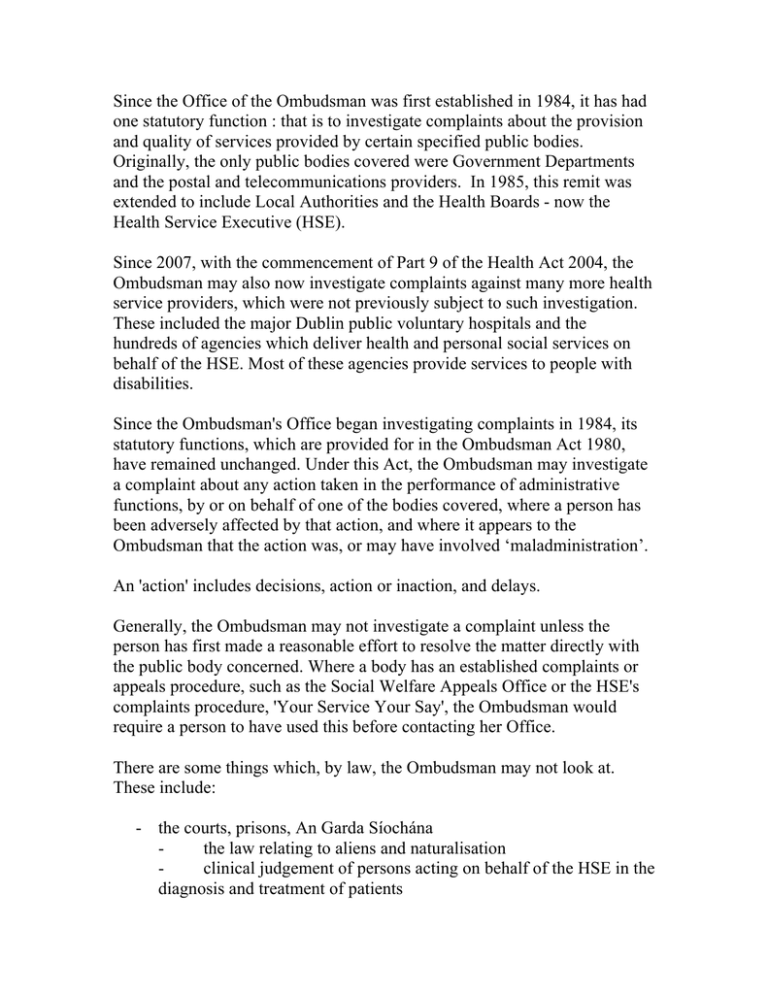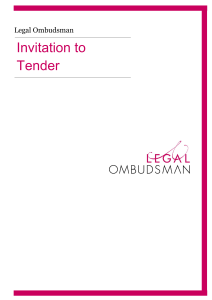Since the Office of the Ombudsman was first established in... one statutory function : that is to investigate complaints about...
advertisement

Since the Office of the Ombudsman was first established in 1984, it has had one statutory function : that is to investigate complaints about the provision and quality of services provided by certain specified public bodies. Originally, the only public bodies covered were Government Departments and the postal and telecommunications providers. In 1985, this remit was extended to include Local Authorities and the Health Boards - now the Health Service Executive (HSE). Since 2007, with the commencement of Part 9 of the Health Act 2004, the Ombudsman may also now investigate complaints against many more health service providers, which were not previously subject to such investigation. These included the major Dublin public voluntary hospitals and the hundreds of agencies which deliver health and personal social services on behalf of the HSE. Most of these agencies provide services to people with disabilities. Since the Ombudsman's Office began investigating complaints in 1984, its statutory functions, which are provided for in the Ombudsman Act 1980, have remained unchanged. Under this Act, the Ombudsman may investigate a complaint about any action taken in the performance of administrative functions, by or on behalf of one of the bodies covered, where a person has been adversely affected by that action, and where it appears to the Ombudsman that the action was, or may have involved ‘maladministration’. An 'action' includes decisions, action or inaction, and delays. Generally, the Ombudsman may not investigate a complaint unless the person has first made a reasonable effort to resolve the matter directly with the public body concerned. Where a body has an established complaints or appeals procedure, such as the Social Welfare Appeals Office or the HSE's complaints procedure, 'Your Service Your Say', the Ombudsman would require a person to have used this before contacting her Office. There are some things which, by law, the Ombudsman may not look at. These include: - the courts, prisons, An Garda Síochána the law relating to aliens and naturalisation clinical judgement of persons acting on behalf of the HSE in the diagnosis and treatment of patients the defence forces, and where the person has already begun court civil legal proceedings The Disability Act 2005 gave the Ombudsman a new role. This is to investigate complaints about alleged non-compliance by Public Bodies, and others, with statutory requirements in Part 3 of that Act, or with the provisions of the six Sectoral Plans. Part 3 of the Disability Act covers accessibility of public buildings, services, information and heritage sites. The Disability Act places an onus on the heads of public bodies to ensure accessibility in these areas – where “practicable and appropriate". One of the important features of the Act is the requirement that all public bodies appoint at least one 'Access Officer' whose role is essentially to assist people with disabilities to access the services of the body. The Disability Act also provides for the right of individuals to complain directly to a public body where he or she believes that the body has failed to comply with any of these 'accessibility' requirements. In this regard, the Act also required each public body to prepare and publish procedures in relation to the making and investigation of complaints. There is a framework complaints procedure in the Act itself and this appears to have been very well conceived. In this regard, it would appear that this had been designed to help public bodies achieve compliance with the requirements of the Act - rather than simply giving people a right to complain. On this point, as I mentioned earlier, there is an onus on the heads of public bodies to ensure compliance. If a person makes a complaint to a public body, it must be investigated by an Inquiry Officer who must make a determination as to whether or not the body was in compliance with the relevant provision of the Act. If that determination is that the body was not in compliance, then he or she must make recommendations as to how compliance can be achieved. The Inquiry Officer's report must be sent to the complainant, and to the head of the public body. If the head then acts on the recommendations of the Inquiry Officer, the body can then achieve the compliance that the head is required to ensure. Once a person has gone through a public body's own complaints procedure, and is dissatisfied with the determination of the Inquiry Officer (or of a Complaints Officer in relation to a complaint about a sectoral plan), they may then make a complaint to the Ombudsman. Such complaints are investigated under the Ombudsman Act 1980, which has been appropriately modified by Section 40 of the Disability Act for this purpose. When investigating complaints, whether they are about ‘maladministration’ or compliance with the Disability Act, the Ombudsman has very extensive powers. Firstly, the Ombudsman in independent in the performance of her functions, and she determines her own procedures. For the purposes of an investigation, the Ombudsman can request any information, document or thing, and she can require anyone to attend before her. Where, following an investigation, the Ombudsman is satisfied that a complaint is upheld, she will recommend appropriate redress. If any such recommendation is not accepted by a public body, the Ombudsman may make a special report to the Oireachtas on the matter. It may appear to some that the Ombudsman's role in relation to disability issues started only with the commencement of the Disability Act 2005. However, this is not the case. Since the Office of the Ombudsman was first established, it has dealt with literally thousands of cases about issues affecting people with disabilities. These complaints were investigated on the basis that there may have been 'maladministration' in relation to action by the public bodies involved, and in many cases, the positive outcomes that were achieved benefitted, not only the person who had made the complaint to the Ombudsman, but at times larger groups of people seeking the same benefits or services. Some examples of some of the 'higher profile' disability-related cases investigated over the years include : 'Provision of School Transport for a Child with Disabilities' [1998] 'Nursing Home Subventions' [2001] 'Tax Relief for Cars Adapted or Constructed for use by Passengers with Disabilities' [2001] 'Care and Treatment of a Patient at St Mary's Care Centre, Mullingar' [2008] 'Refusal of Applications for Domiciliary Care Allowance' [2008] 'Who Cares - The Right to Nursing Home Care in Ireland' [2010] Reports of these and other investigations conducted by the Ombudsman, many of which have been laid before and debated by the Houses of the Oireachtas, are available the Office's website : www.ombudsman.ie. Given that the Ombudsman's sole statutory function is to examine complaints, can she also make a contribution in the area of monitoring in relation to the rights of people with disabilities? On this question, the Ombudsman would say 'Yes' - and again she would also say that this is a role her Office has been fulfilling since its establishment over 26 years ago. One way in which this has been achieved has been through her investigations, and the publication of the reports of these - many of which have been debated in the national parliament. Another way of highlighting issues is through her Annual Report to the Oireachtas. In addition to the statutory requirement to report annually on 'the performance of her functions', the Ombudsman also uses her report to give specific details of individual complaints handled during the year, as well as to draw attention to broader issues of concern that had arisen. A relevant example of the latter was her 2008 Annual Report (published in June 2009) in which she commented on the apparent failure by a majority of public bodies to comply with the requirements of the Disability Act 2005 to appoint Access Officers and also to publish procedures in relation to complaints about non-compliance with Part 3 of that Act. Her concerns were raised because of the extremely low numbers of complaints she had received in the three years since the Disability Act came into force. She had examined the websites of over 100 of the (650 or so) bodies covered by the Act and found that only 19% published information about the contact details for, and services provided by, Access Officers and less than 5% had published the complaints procedures required by the Act. In her Annual Report the Ombudsman commented that: "These failures, I feel, must seriously hinder very vulnerable people in their efforts to avail of services to which they are legally entitled. Ultimately, these failures undermine the statutory right of people with disabilities to complain where public bodies fail in their duty to them. This is wholly unacceptable. ". Arising directly from the attention that had been drawn to this issue in her Annual Report, the Institute of Public Administration (IPA) organised a training seminar for Access Officers, and the Ombudsman was invited to address this. One of the points the Ombudsman made to the Access Officers was that she is certain that where a public body does publish information about the services of an Access Officer, and the procedures for dealing with complaints about Part 3 of the Act, people will avail of them. She was able to say this with such certainty because, in the case of her own Office, this information is published and people with disabilities do contact it to arrange assistance from the Access Officer to access our services. The Office has also received complaints from clients about our own failures to comply with Part 3 of the Act. Without going into any detail about these, the complainants were 100% correct and the investigations of their complaints did lead to changes to our procedures. In conclusion, I would like to say that regardless of whether, or not, the Ombudsman has any 'formal' oversight role in relation to the Convention on the Rights of People with Disabilities, she will continue to investigate all complaints that come within her remit. She will also continue to highlight any issues of concern that come to her attention through her work. In this way, the Ombudsman will continue to play a valuable role in bringing these concerns to the attention of the legislators and administrators, regulators and monitors, the media, service users and providers and the wider general public. Thank You



